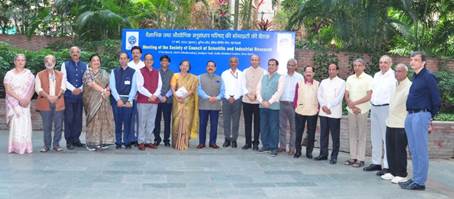The Year End Review 2024 of the Council of Scientific and Industrial Research (CSIR) highlighted several major achievements across various sectors, showcasing India’s progress in scientific and technological advancements.
CSIR-CRRI’s REJUPAVE technology, designed for high-altitude bituminous roads, was successfully deployed by the Border Road Organization (BRO) in Arunachal Pradesh and Ladakh.
This technology enabled road construction in challenging sub-zero temperature conditions on the China border and in Kargil, Ladakh.
In January 2024, the country’s first national highway steel slag road section on the NH-66 Mumbai-Goa Highway was inaugurated. This 1 km stretch was constructed using 80,000 tons of processed steel slag, marking a significant step toward sustainable road construction.
CSIR provided technical support for the construction of the Ram Mandir in Ayodhya, including the “Surya Tilak” system, which channels sunlight onto the forehead of the Ram Lalla idol during Ram Navami each year.
CSIR-National Institute of Oceanography (NIO) launched the C-Bot, an autonomous underwater vehicle designed for coral reef monitoring.
This robot can reach depths of 200 meters and will help in long-term coral reef surveillance.
CSIR-National Metallurgical Laboratory (NML) inaugurated India’s first lithium battery recycling pilot facility, contributing to sustainable battery recycling and reducing dependence on imports.
India’s first hydrogen fuel cell catamaran, developed by CSIR in partnership with KPIT, was launched in collaboration with Cochin Shipyard Limited (CSL). This vessel aims to promote green energy in inland waterways.
CSIR-National Aerospace Laboratories (NAL) successfully tested a new UAV that can fly at 20 km altitude, powered entirely by solar energy. The satellite is designed for surveillance, disaster management, and other applications.
CSIR-NEIST discovered a new flowering plant species, “Begonia Narahari,” in Arunachal Pradesh. This discovery honours the former director of CSIR-NEIST for his contribution to the region’s bio-resources.
CSIR-NIIST developed NOWA, a sustainable technology for treating organic wastewater in hotels and restaurants. This on-site technology recovers reusable water, bio-energy, and organic manure, addressing urban waste challenges.
CSIR-Institute of Microbial Technology (IMTech) discovered promising molecules for the treatment of Parkinson’s disease, which could lead to the development of an effective cure in the future.
CSIR-Indian Institute of Chemical Technology (IICT) developed a new process for manufacturing CL-20, a high-energy propellant, setting India on the path to self-sufficiency in rocket fuel production.
CSIR-Central Mechanical Engineering Research Institute (CMERI) introduced an electric tiller designed for small farmers, promoting sustainable agricultural practices with zero emissions and enhanced efficiency.
CSIR-NAL developed indigenous Kamikaze drones, enhancing India’s defense capabilities. These drones are designed to strike targets after hovering for long durations, powered by a home-built engine.
These achievements reflect CSIR’s broad contributions in areas like infrastructure, defense, sustainable technologies, and healthcare, positioning India as a leader in scientific innovation and sustainable development.




















